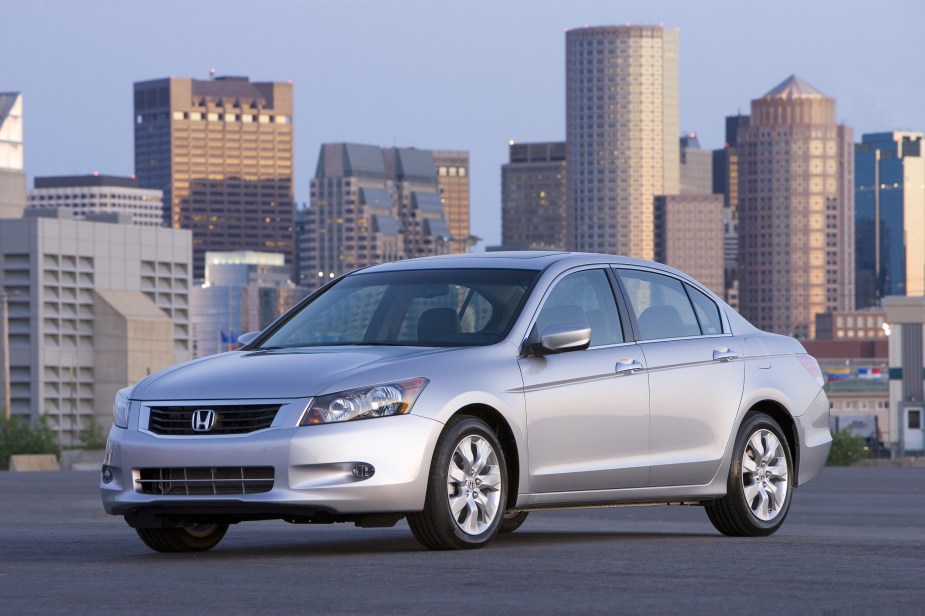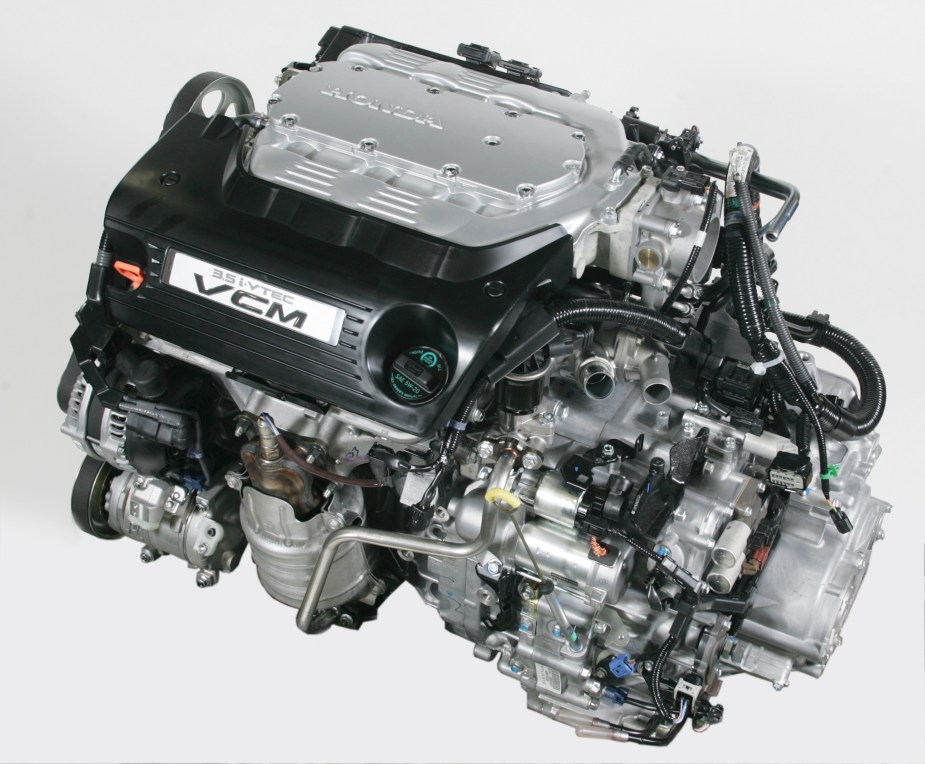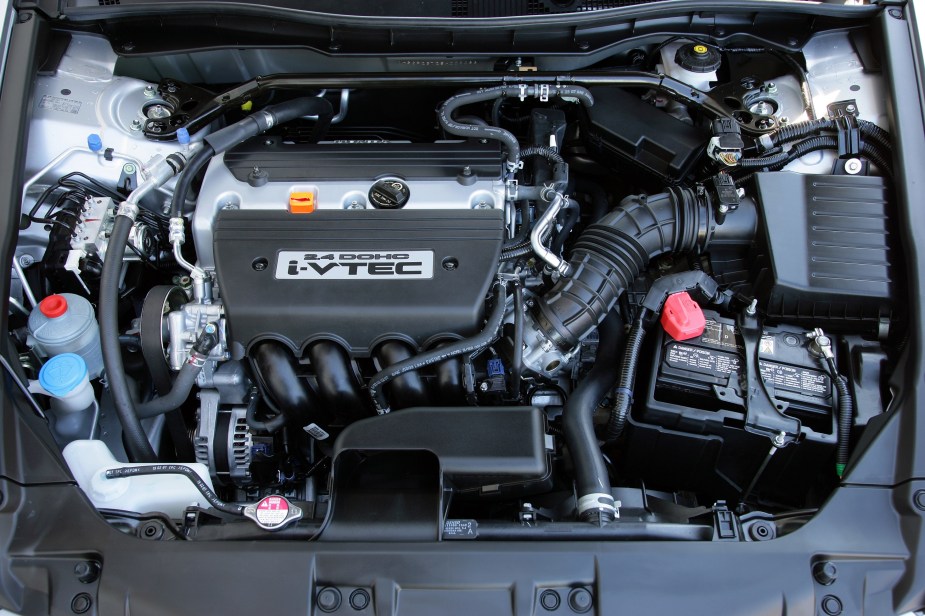
7 Most Common 2008-2012 8th-Gen Honda Accord Problems After 100,000 Miles
Most common problems on 8th-gen 2008-2012 Honda Accords with 100,000-plus miles guide highlights:
- Worn brake pads and seized or leaking brake calipers are some of the most common problems on high-mileage 8th-gen Honda Accords
- The 2008-2012 Accord’s four-cylinder and V6 engines have some specific issues, but excessive oil consumption can affect both
- After 100,000 miles, an 8th-gen Accord might need a new crankshaft position sensor, alternator, starter motor, and/or a blower motor
Whether you want a new car or a used one, it’s hard to go wrong with a Honda Accord. It’s practical, affordable, surprisingly fun to drive, and arguably most importantly, reliable. However, even the most stalwart cars develop some problems as they age, and the Accord is no different. Plus, though the 8th-gen Accord is pretty stout, some flaws popped up over its lifespan. So, if you’re thinking of buying a 2008-2012 Honda Accord, there are a few problems you should keep an eye out for.
Some of the most common 8th-gen Honda Accord problems involve the brake pads and calipers

One of the most common problems 8th-gen Honda Accords experience even before they hit 100,000 miles is brake pad wear. Yes, I’m fully aware that brake pads are wear items on all cars. However, barring extreme circumstances, many pads can last up to 70,000 miles or more. But many early-model 8th-gen Accord brake pads couldn’t even last half that long, which led to several class-action lawsuits.
On the plus side, these excessive wear issues mostly plague the rear pads of 2008-2009 Honda Accords. Unfortunately, even 2011-2012 models aren’t immune to other high-mileage brake problems. After 100,000 miles or more, 8th-gen Accords’ rear brake calipers can seize in place. If that happens, you either have all the brakes or none. The latter situation can also occur if the calipers start leaking, which is another high-mileage issue, Samarins reports.
The good news is that Honda addressed some of the 8th-gen Accord’s brake wear issues by adjusting its Electronic Brake Distribution system. So, all afflicted 2008-2009 Accords should have the updated system by now. Furthermore, while a big brake kit is a bit overkill, using different pad materials might reduce wear even more.
The 2008-2012 8th-gen Honda Accord often has oil consumption problems

Besides brake pad wear, 8th-gen Honda Accords often suffer from excessive oil consumption as they age. Now, it’s not unusual for high-mileage used cars to burn a little oil, especially if their PCV valves are broken. However, the 2008-2012 Accord often chews through more than just ‘a little’ oil on a regular basis.
At least some Accords’ oil-drinking habits stem from deposits on their pistons’ oil control rings. If the rings stick to the pistons too much, oil seeps past them and into the combustion chambers, where it burns up. Honda issued a technical service bulletin, TSB # 12-087, to replace the pistons and rings in affected engines. So, if your Accord is burning oil, check if it’s had its TSB work done.
But not all 8th-gen Honda Accord oil consumption problems stem from those piston rings. Some stem from another engine issue.
Honda addressed the 2008-2012 Accord V6’s VCM problems

From a performance perspective, there’s a lot to like about the 2008-2012 Honda Accord’s 3.5-liter V6. The 278-hp engine turns the humble commuter car into a sleeper that can keep up with an EcoBoost Mustang in a straight line. However, the V6 also has a problem that can, among other things, cause excessive oil consumption.
To save fuel, Honda gave the V6 variable cylinder management (VCM), aka cylinder deactivation. Using oil pressure switches, the engine’s computer can turn off some of its cylinders under light loads. Unfortunately, the software had some bugs that caused VCM to repeatedly turn on and off. This not only increased the V6’s oil consumption but it also fouled the spark plugs, causing misfires, AutoGuide explains.
Fortunately, Honda addressed the 8th-gen V6 Accord’s VCM problems with a TSB, #11-033. It’s basically a software update that resolves the on-off cycle. And while the oil pressure switches can fail over time, they’re inexpensive and fairly easy to replace.
One more thing about the V6 Accord, though. Some owners complain about the V6’s six-speed automatic transmission failing and/or experiencing clunky shifts. This issue appears to be fairly uncommon, however. In addition, it seems mostly limited to cars that didn’t follow proper automatic transmission fluid replacement procedures. But it’s worth keeping in mind because shuddering could point to a failing torque converter, AutoGuide says.
If your four-cylinder 8th-gen Honda Accord’s VTEC isn’t kicking in, check the actuator
The import scene has several siren songs, and one of them is a Honda four-cylinder’s VTEC hitting. Meme history aside, Honda’s variable valve timing system lets its engines prioritize power at high rpm and efficiency at low rpm. And it’s just one reason why the K24 four-cylinder in Honda cars like the 8th-gen Accord is a popular tuning platform.
However, the 2008-2012 Honda Accord’s K24 had some problems with its VTEC system. The part that regulates the system, the VTC actuator, had a defective pin that caused it to rattle, especially during startup. According to Samarins, the rattling actuator seemingly didn’t cause any internal damage. But it was annoying and, because the actuator controls the camshaft timing, if it failed, it could’ve damaged the engine.
As with the V6 VCM, though, Honda has since addressed this issue with a TSB, #09-010. So, if your four-cylinder 8th-gen Accord’s VTC actuator still rattles, go to a dealer to get it replaced with an updated version.
After 100,000 miles, your 2008-2012 Accord might need a new crankshaft position sensor
Although the 8th-gen Honda Accord has some engine-specific problems, one issue can affect both V6 and four-cylinder models.
Like many engines, they have crankshaft position sensors that monitor, well, the crankshaft’s position. Or rather, they watch a reference point on the crankshaft to measure its rotational speed and relative position. This lets the engine’s computer know how fast the engine is turning and let it set the ignition timing. And if the sensor starts failing, your engine will either misfire, cut out intermittently, or refuse to start at all.
Luckily, 8th-gen Accord crankshaft position sensors are pretty cheap. Also, it’s relatively easy to locate—it’s underneath the engine secured by a metal plate. However, installing a new crankshaft position sensor requires an engine relearn procedure. Some OBD2 scanners and tools can do this, but if you don’t have the appropriate one, you’ll need to visit a mechanic.
Alternator and starter motor failure isn’t uncommon on high-mileage 2008-2012 Accords

Besides a failing crankshaft position sensor, there are two other parts that can cause starting problems in a high-mileage 8th-gen Honda Accord. One is a bad alternator, which sometimes fails on 2008-2012 Accords as the miles pile on. The other is a bad starter motor, which can afflict these cars, too, Samarins reports.
Although neither is a ‘good’ problem to have, replacing these parts isn’t particularly expensive. You can even replace the alternator yourself if you have the time. But if you don’t, replacing the starter motor typically costs $490-$680, Samarins claims. And getting a new alternator installed is even cheaper.
8th-gen Honda Accords can develop HVAC problems
Now, it’s not unusual for old cars to need an air-conditioning system recharge every so often. But after 100,000 miles, an 8th-gen Honda Accord might have other A/C and HVAC problems.
One of the most common is a broken blower motor, 1AAuto reports. This doesn’t just rob your Accord of A/C, though: it means you don’t have heat, either. Luckily, the 2008-2012 Accord’s blower motor sits underneath the glovebox behind a plastic panel. And swapping in a new one is a matter of removing some bolts and an electrical connection.
The other 2008-2012 Honda Accord HVAC problem is A/C-specific. Although the 8th-gen Accord’s grille is great for airflow, it doesn’t protect the A/C condenser from road debris very well. As a result, many condensers end up damaged and leaking. And fixing this requires both a new condenser and new refrigerant.
Follow more updates from MotorBiscuit on our Facebook page.


